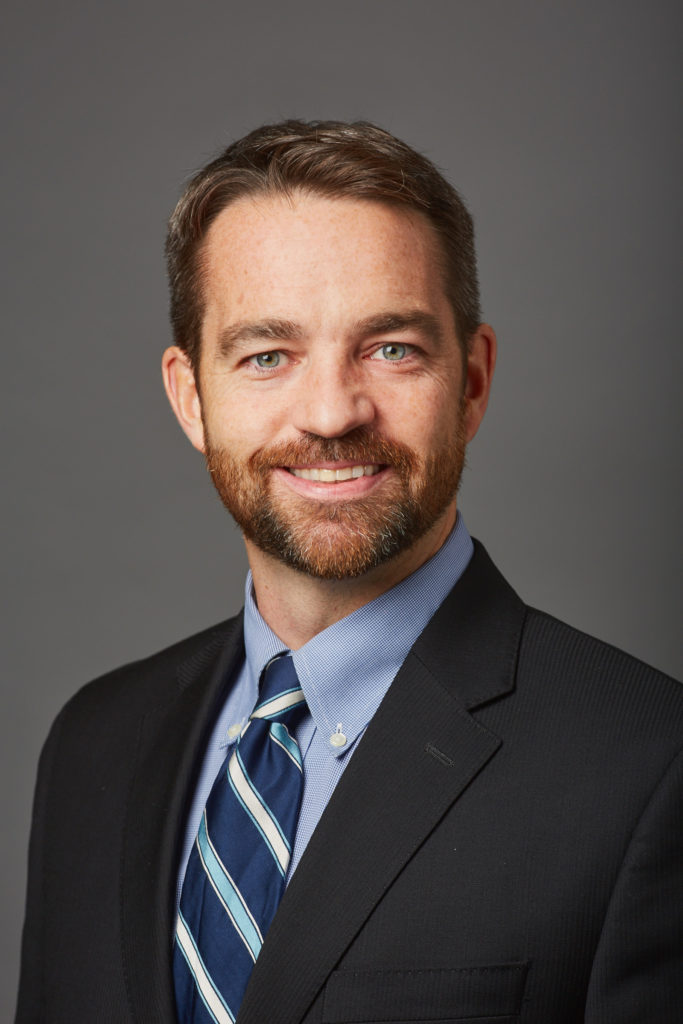Reflections on my journey thus far living with cancer
“Don’t forget behind your ears!”
– Mary Enquist (on repeat all summer)
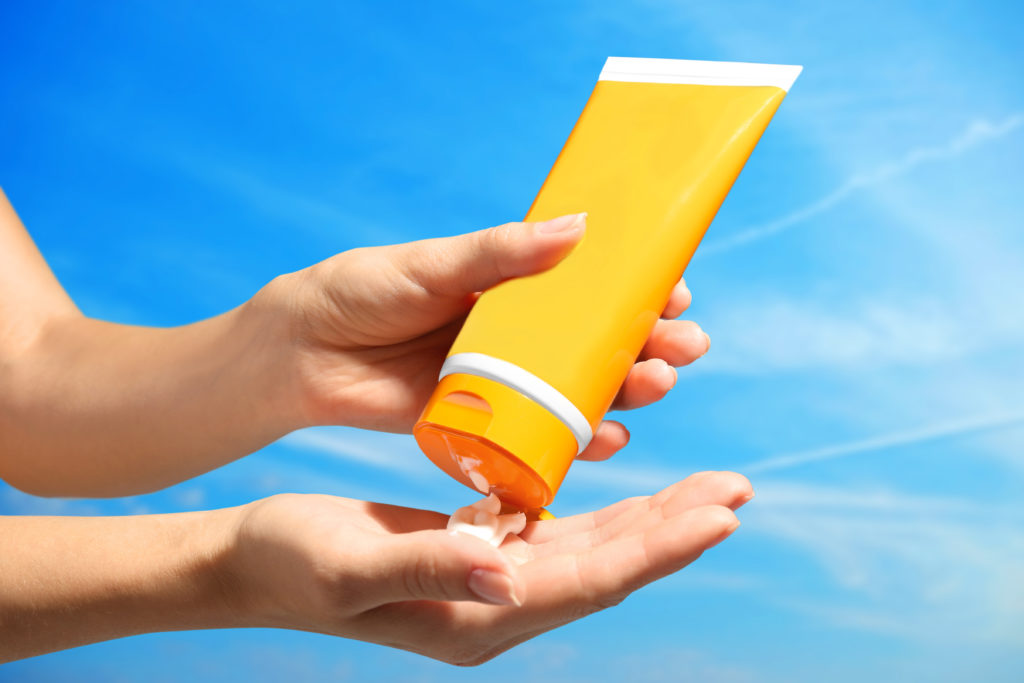
“What a mom thing to say,” I chuckle to myself. Harkening my parents’ command to remember to wash behind our ears, my battle cry this summer relates to sunscreen. Three months ago, I was diagnosed with melanoma. It’s been quite an experience. I feel so incredibly lucky, supported, and loved, and it’s been hard, painful, and has felt a bit unfair. While paradoxical, these sets of feelings are equally strong and valid.
The emotional rollercoaster upon hearing: “You have cancer”

In healthcare, we know that a patient stops listening and cannot cognitively absorb much after hearing these three words, “You have cancer.” Suddenly you are thrust into that moment you’ve secretly feared your whole life. Your mind accelerates, rapidly cycling through worst case scenarios.
For me, I was overwhelmed, playing out the implications that my new diagnosis might have for my family, livelihood, and future. Equal parts disbelief and conviction that “I knew it; I knew this would happen to me!” shakes together a cocktail of emotions that numbs your ability to think rationally, at least temporarily.

Rebounding hard, even minutes later, you find yourself dismissing the unexpected news. It’s fine. I’m fine. Everything is fine. A brick wall of denial comes crashing down protecting you from the intense fear. It has to be fine, right?! Perhaps not wanting to be overly dramatic, you stuff those big emotions and/or invalidate them, denying the potential changes to your risk profile and life expectancy.
You place your diagnosis in the category of “Not that bad…especially compared to what some other have gone through!” For me I had so much going on in my cockamamie life, trying to prove myself in a new job, juggling the demands of two raising young kiddos, and climb out of the exhaustion of supporting NYC’s COVID response as a healthcare worker. I could not take on another worry, especially of this magnitude.
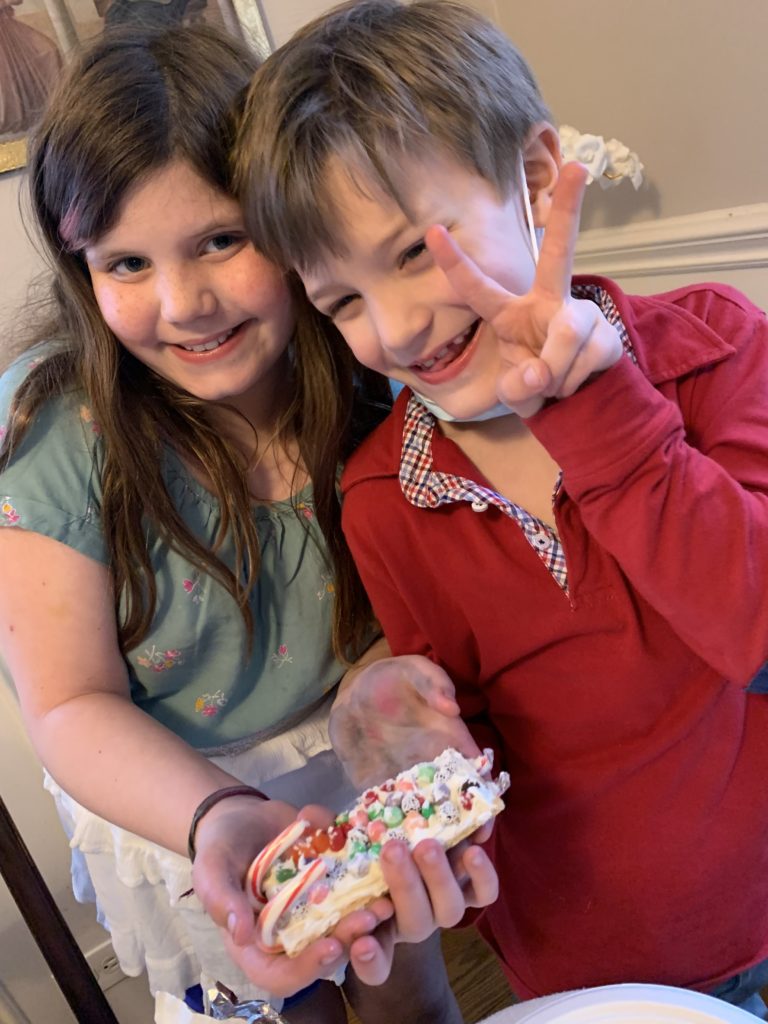
You do not want to worry others, especial your children. Seeing their fear play out is heartbreaking and you would do anything to take it away, desperately wanting to preserve all joy in their childhood. And then there is the isolation inherent in going it alone. I found it almost suffocating. I needed to lean hard on a few very close friends and my siblings. You try walk that middle line. Moments of overwhelm and fear give way to humor and jokes to downplay how scary it all feels. Expressions of love and support elicit humbling gratitude, chased by persistent and lingering thoughts of “Do I really deserve all this?!?” “My cancer isn’t really that bad.” “I didn’t realize people loved me this much.”
In the same breath, when someone treats it like no big deal and dismissively refers to it as “just” skin cancer, it takes everything you’ve got to not give a full out lecture on how aggressive and dangerous melanoma can be. A science professor, educating them on the differences between various skin cancers, both benign and malignant, you underscore that they all are a big deal, and more empathically, really suck and are scary diagnoses for the person experiencing it.

Comradery of a shared enemy
Three long months since hearing those three awful words myself, I’ve compared notes with others who have gone through various cancer diagnoses and treatment. Much to my surprise, my experience seems pretty normal and I have learned that I am not alone. If you or someone you love has been impacted by cancer (assuming that is just about everybody) – I want to underscore that even though you might be cycling through big emotions – you are not crazy – and you are not alone either. We are in this together!
I have had many loved ones, colleagues, friends of friends reach out, showering me with love and support, and asking basic questions about melanoma, and skin cancer more generally. Disclaimer: I am not a clinician, nor an expert in melanoma. I am sharing what I have learned in my experience as a patient which might be helpful to some.
How it all began: My big sister, my hero
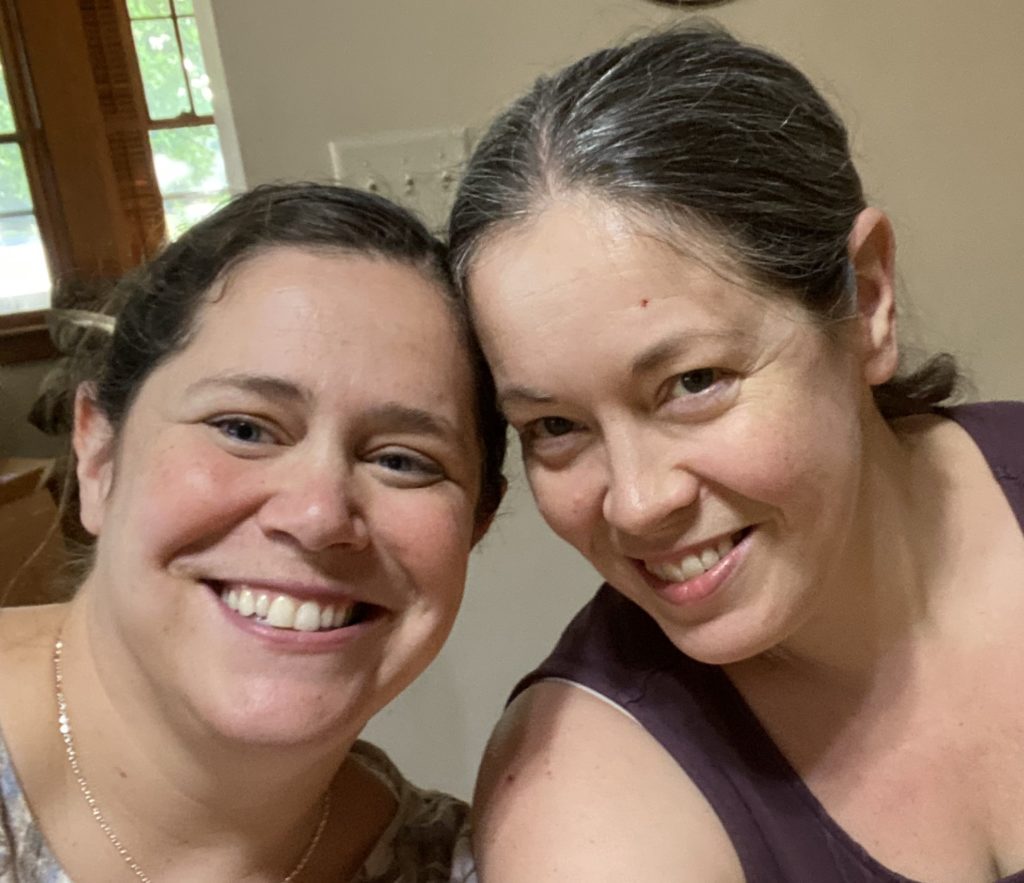
It was our first post-COVID family gathering last June after 18 months apart, not unlike many long-distance families during the pandemic. I had a fairly large, somewhat unusual mole growing behind my left ear. I couldn’t see it from the front when I looked in a mirror. It wasn’t until my sister, Kelly, pointed it out that I was even aware that it was there.
As only a sister would notice (and might feel comfortable enough to mention), “Hey Mary, do you know that you have a big, kind-of-concerning-looking mole on the back of your ear?” We were walking down a hotel hallway on the way back from the pool with our kiddos, my hair was pulled back in a pony tail. Entering our hotel room, I flipped the floppy back of my ear (called the helix) towards the mirror. There it was! Ick! Hmm. Probably nothing, I thought with some trepidation, and I mentally noted that I should get it checked out when I returned to New York, which I did later that month (June 2021). The dermatologist agreed, it was probably nothing and suggested that we monitor it.
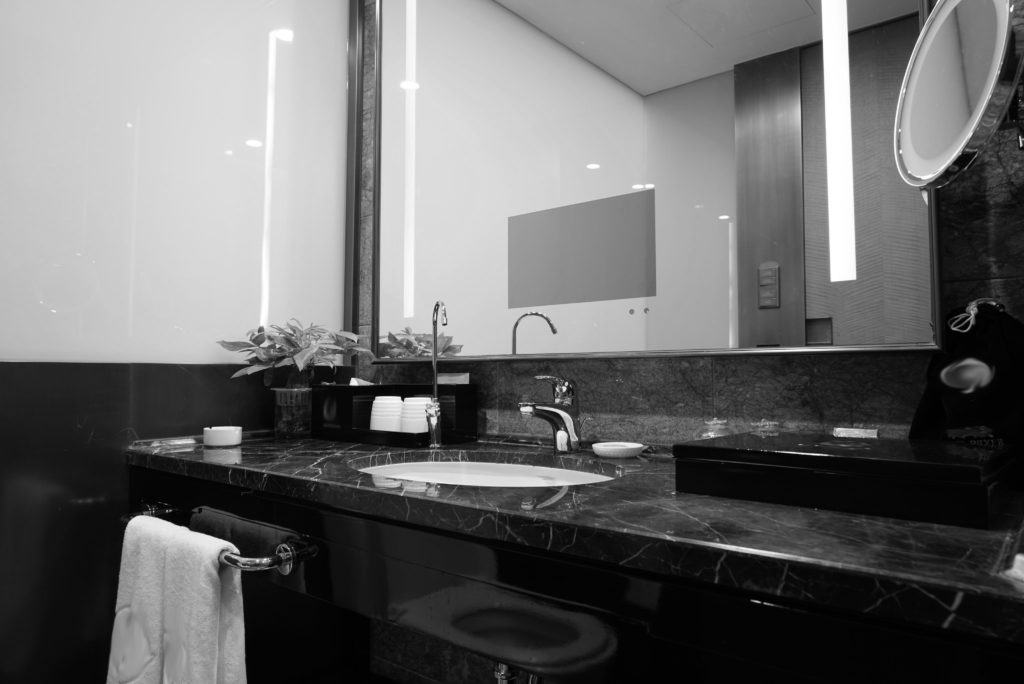
An ounce of prevention is worth a pound of cure
An ounce of prevention is worth a pound of cure.
– Benjamin Franklin
January 2022 I took the biggest risk in my career to date in deciding to leave my beloved NYU Langone Health to accept a position at Yale New Haven Health. I set up all my preventative doctors’ visits. Our medical insurance would change and in some cases, our providers would need to change, if now out of network. I had seen my dermatologist as recently as six months ago, but figured that it couldn’t hurt.
My January 2022 appointment coincided with the afternoon I resigned. Considering how emotionally distracted I was that day, my Dermatologist could have told me that my skin was going to turn purple and peel-off and my response might have been “Yeah, that’s cool. Thanks, doc. It’s been a big day!” I do recall Dr. David Polsky spending some time rechecking the ugly ear mole, using a cool new hi-tech imaging technology. He said I was one of the first patients he was using it on. Based on the imaging, Dr. Polsky noted irregularities, doubted melanoma, and still wanted to monitor it. Dr. Polsky asked to see me in April once I got settle in my new role and on my new insurance coverage.

Every good excuse to deprioritize my own health and wellness
Classic non-compliant patient/busy person/working mother, I had every good intention of booking the visit, and I failed to do so. Dr. Polsky actually noticed(!) that I never came in for my follow-up care and reached out to me directly via MyChart, the patient portal. I booked a Saturday appointment that allowed me to travel into Manhattan.
As the appointment drew near, I canceled the appointment for insurance reasons. Dr. Polsky was now out-of-network and knowing what I know about patient financial exposure, I got nervous that I might unintentionally put my family in a situation where we owed thousands of dollars. I intended to see another in-network dermatologist. Jammed with long waitlists, a physician referral is required to book with a new Dermatology practice. Annoying! Many patients would have given up given this barrier to access. To be perfectly honest, I thought about it. I had a lot going on and not a lot of time for myself. Instead, I sent Dr. Polsky a message in MyChart to see if his practice could send referral.
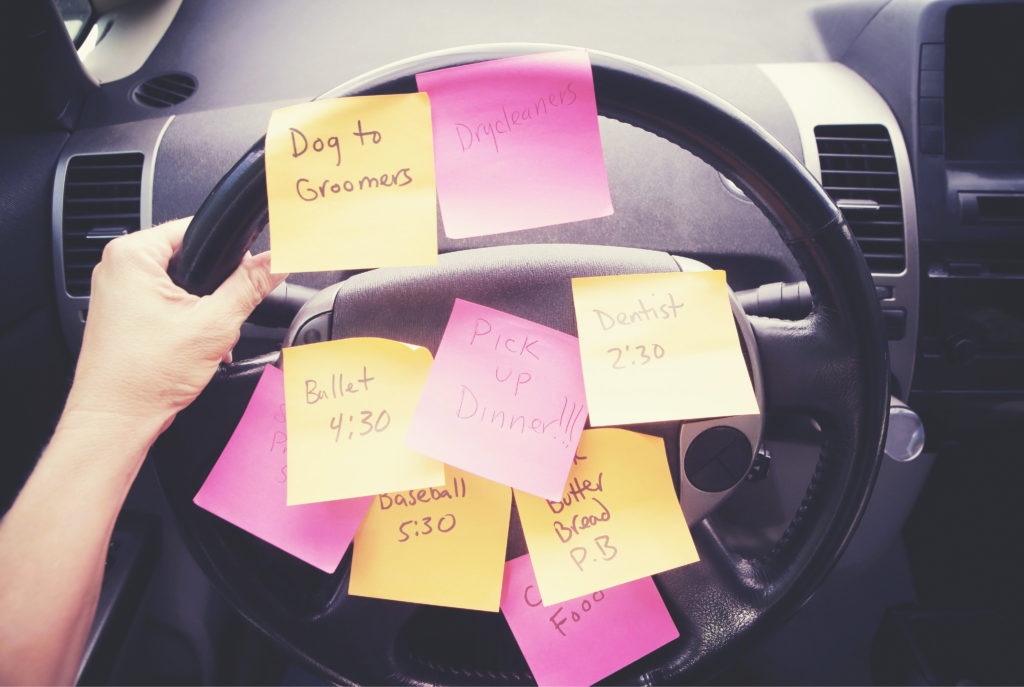
A truly exceptional physician committed to patient care
Dr. Polsky’s office called, and insisted that I come in. Dr. Polsky financially comped my visit to ensure that there was no barrier to care. Wow! What a truly above & beyond gesture! I was touched and now terrified.

Overwhelmed by a tsunami of nostalgia, I entered NYU Langone’s relatively new 41st Street Ambulatory Care Site, that I’d spent years planning for with my colleagues. The check-in process was streamlined and perfect. The building was beautiful and on brand as all NYU Langone sites are. I knew Dr. Polsky as a MD, PhD and the Vice Chair of Research for the Ronald O. Perelman Department of Dermatology at NYU Langone Health (hoping my former marketing colleagues are smiling at my precision there). He was the cream of the crop. It felt like coming home. I felt safe and well-cared for. I knew I was in good hands!
The extraordinary care I was receiving made me pause and reflect on the gapping chasm of health equity in our country, something I’m incredibly passionate about. Here I sat in my own extreme privilege, knowing that my experience was FAR FROM the norm. It felt unfair and at the same time, I was incredibly grateful to not have fallen through the cracks myself in the inherently fractured care delivery system in the United States.
Dr. Polsky reimaged the mole with the same technology and noted some differences. He did a shave biopsy which confirmed the melanoma. He made the point to note that “Early detection ONLY works IF the patient comes back.” He also emphasized the need for my siblings to get checked routinely given our shared genetics and upbringing, used as a proxy for similar sun exposure.
“Early detection ONLY works IF the patient comes back.”
– Dr. David Polsky, MD, PhD
Now on to surgery!

Finding an in-network oncological surgeon was a must financially. Having moved over to the Yale Employee medical insurance, I sought care in New Haven. A few colleagues pointed me in the right direction and my new diagnosis of Melanoma put me at the top of the list for prioritization. The name that came back was Dr. James Clune, a top-notch, dually board certified, surgical oncologist and plastic surgeon.
I would need to have pizza-shaped wedge surgically removed from the helix of my left ear, taking about 1/3 of the ear tissue to ensure oncological margins. Then while I was still under anesthesia, my surgeon would reconstruct it using cartilage from other parts of my ear and skin flaps from behind my ear. I will need to see a dermatologist every three months for the rest of my life, and a medical oncologist every six months for the next five years. I was told that once I’d covered surgically, many people wouldn’t be able to notice. I didn’t believe that for a second. Now 8-weeks post-surgery, he was right! It’s incredible.
My melanoma had been caught early, given it’s staging I ought not have much to worry about. The chances were slim that surgery would expose additional spreading into my lymph nodes. Still, I had never had surgery before. The idea of needing to have 1/3 of my ear removed was frightening! I was a bit emotional as I packed my things to drive the roughly one hour north. Dreading going to my first oncology appointment alone (including the commute each way), in a last minute impulsive decision, I decided to bring Snickerdoodle.
The beauty of an emotional support animal
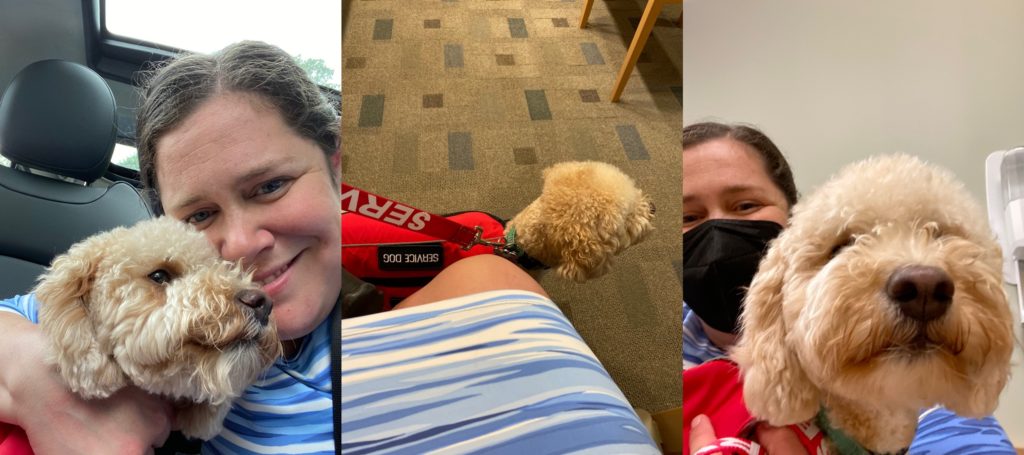
I was new at Yale. No one really knew me. I would have otherwise been extremely self-conscious to show up with a certified emotional support animal at work (my own insecurities, I suppose, about appearing weak). Given we fly with our pups, Snickerdoodle is registered as a certified emotional support animal and fit the bill. It was the best decision I made! For the remainder of the day, I was focus on her and not worrying about the unknown.
Snickerdoodle brought a smile to the face of every person I interacted with as I entered Yale’s Smilow Cancer Center, which softened them to me immediately, and brightened the day of some sweet older ladies that were going through chemo. Snickers was perfectly behaved, except in radiology where she needed to be outside the magnetic field. I heard a sharp protective bark anytime the radiological tech touched me to position me for imagining.
If I had known the level of pre-surgical work-up that would be required that day, I would never have brought her. That being said, seeing my soon-to-be surgeon, Dr. James Clune charm the little lady and rub her belly did inspire confidence in him beyond his outstanding credentials. He was human, non-judgmental, and caring. That meant a lot to me.
Gearing up for battle

The day of surgery, my husband, Matt, drove me up to Yale’s Shoreline Surgical Center in Guilford, CT (Snickers stayed home). My husband and I traded laughs on the drive up, doing some online shopping on Amazon for 80’s era crimpers and scrunchies that might stylishly cover my left ear during surgical recovery.
I was fine until we pulled into the parking lot and it was time to go inside. My cognitive brain knew I was among the most routine, least severe patients that this surgical site would likely see that day. And in that moment, I was petrified! Hesitant to get out of the car, I felt sick to my stomach. The last thing in the world I wanted to do was walk into the lobby and get prepped for surgery. Each patient’s experience is unique and different. I can imagine another person gladly marching up to the door, desperately wanting to malignant tissue cut out. For whatever reason, while I wanted that too, the emotions were real.
Nonsensically, I just wished that I DIDN’T HAVE TO, which of course was not an option. There was a very high likelihood that the surgery would prove curative. A second deep biopsy suggested that this particular melanoma had not yet spread to my lymph nodes. Medically speaking, I had little to worry about. I walked with my husband into the lobby, and settled down once I was in a pre-op room/bed. It was going to be ok. I felt safe again, and made a mental note of the need to dramatically up my empathy whenever I interact with patients or family members at our care facilities. I always opened doors for patients and tried to make them feel at ease, now here I was as the patient. I felt so vulnerable. No matter how routine a procedure or medical appointment may seem for us as care providers, to our patients, it’s often their worst day ever. Cleveland Clinic’s industry-famous patient experience video flooded my senses.

Grateful thanks to those who made donations and supported me!
Why do bad things happen to good people

Since joining the dreaded club of people living with cancer, it is almost impossible to not blame yourself. The internet is NOT YOUR FRIEND. Why did this happen? Was it the 7+ years I ran five full marathons and at least 20 half marathons, as a charity runner for the Leukemia & Lymphoma Society? Endurance athletes do have higher risks for skin cancer, and boy, did that feel like really unfortunate karma. I was always careful about applying sunscreen, and when you are exercising outdoors for 2-5+ hours, bathing in your own sweat, it’s easy to forget to reapply.

In terms of childhood sun exposure, as a young girl, my mom and I rode horses daily for hours in the summer sun during an era where sunscreen was not widely used. I recalled a particularly blistering sun burn working call sheets for skeet shooting over the Fourth of July at the Walsh County Gun Club.
Had I used tanning beds? Yes, but not a lot. I went a few times ahead of prom. I was cast as a Latina in a couple musicals and wanted to look the part. And while I had shifted to sunless tanner by then, I tanned ahead my wedding, not wanting my white dress to have an orange ring where it touched my skin. These were the years that it was thought to be healthy to establish a base tan, especially for fair-skinned people like myself. I kind of knew better, and everyone was doing it.

Choose any cancer (or chronic condition) under the sun, and you will find websites shaming you for any imbibing in white wine. My favorite wine is a good Russian River Valley Chardonnay.
My best friend, who is 10+ years into remission from a very serious and aggressive form of non-Hodgkin’s Lymphoma had to stop me. “Mary, this is not your fault. Sometimes bad things just happen.” Trying to free me of the guilt and the shame, her words validated the pain I had been enduring. I had lived a perfectly risk-free life, and how can you? It wasn’t my fault.
The journey of survivorship
Having put surgical oncology behind me, the adrenalin and grace I have felt these last several weeks has been incredible. A fresh start, I was ready to run, have impact, and realize my potential. Last week, my first medical oncology visit knocked me to my knees. Being advised that given my risk profile that it was best I not be outdoors between the hours of 10am and 4 pm hit me like a ton of bricks. Ugh, I’m a mom of two relatively young kiddos and pride myself in being an active person. How is that suppose to work?
Incredibly thorough, my physician, before sending me down for a blood draw/lab work, explained what an abnormal result would look like when my results came back in my patient portal. I felt confident I was in the clear, said goodbye and thanked her, and headed to another floor to have my blood drawn. Even before I arrived at home from the visit (a bit of a commute), there was a message in MyChart. As I clicked into it, my lab values were elevated and in concerning ranges. Again, tears and a crushing wave of emotions. A few days later, I learned that it’s possible that the elevated levels of lactic acid in my blood work may be a result of re-engagement in exercise post-surgical clearance. I don’t blame my oncologist, and kind of wish she would have led with that. The next month awaits further testing and a full body dermal scan. I am holding space for much ambiguity.
As I wait and continue to walk this life-long journey of being someone with a malignant form of cancer, I hang my hat on the three virtues of faith, hope, and love. I have faith in my medical team, the prayer warriors lifting me up, and in God’s plan for my life. I have hope in my chances (particularly with early detection and treatment) and will be a MUCH better patient going forward. I have been surrounded by the love of those who care about me. People came forward from every chapter of my life. It may have felt like a small gesture, but to me – it was huge! For this I am forever grateful.
To close – A Public Service Announcement: Remember the sunscreen all year long, and lather your kiddos. Remember to reapply every 1-2 hours you are out in the sun, more frequently if you have interaction with water. Wear sunscreen even on overcast days.
Skin cancer IS cancer. Don’t minimize it. Melanoma can change stages as aggressively as every six weeks. I had no idea before it happened to me! If you are concerned and haven’t seen a dermatologist, I strongly encourage you to make it a priority and to take the time to check your moles and any pigmentation. In between Dermatology visits, you can do self-exams at home once a month. Instructions: here. Lastly, don’t forget to behind the ears!


